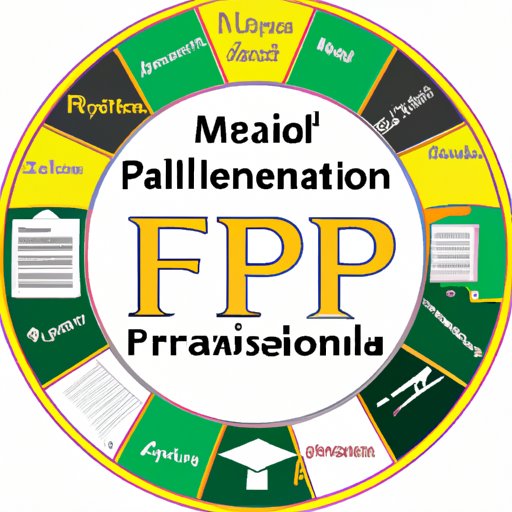Introduction
Financial planning is an essential part of successful wealth management. A financial planner can help you develop a plan to meet your long-term goals and manage your current finances. But do you need a degree to be a financial planner? In this article, we will explore the pros and cons of having a degree to become a financial planner, as well as how to succeed as a financial planner without a degree.

The Necessity of a Degree for Financial Planning Success
The primary role of a financial planner is to provide advice on how to best manage your money. To do this effectively, a financial planner must have a thorough understanding of financial topics such as investments, taxes, retirement planning, insurance, and estate planning. Therefore, it is important for financial planners to have the right skills and knowledge to properly advise their clients.
In terms of educational requirements, most financial planners have at least a bachelor’s degree. Common degrees that are beneficial for financial planning include finance, accounting, economics, business administration, and mathematics. Some financial planners may also choose to pursue a master’s degree in a related field, such as financial planning or taxation.
In addition to a degree, many financial planners also obtain professional certifications, such as the Certified Financial Planner (CFP) or Chartered Financial Analyst (CFA). These certifications demonstrate a higher level of expertise and can help financial planners stand out from their peers.
How to Succeed as a Financial Planner Without a Degree
While having a degree can be beneficial for financial planners, it is not always necessary. There are several ways to gain the skills and knowledge needed to become a successful financial planner without a degree.
First, it is important to develop the right mindset. Having a positive attitude, strong work ethic, and passion for helping others can go a long way in this profession. Additionally, gaining experience through volunteering, internships, or apprenticeships can be valuable for those looking to launch a career in financial planning.
Finally, utilizing professional organizations and networks can be helpful for connecting with other financial planners and finding potential job opportunities. Many of these organizations offer resources and training, which can be beneficial for those without a degree.

Navigating the Path to Financial Planning with or Without a Degree
Regardless of whether you have a degree, there are several steps you should take to become a financial planner. First, you should access education resources to learn more about the field and develop your skills. This could include reading books, attending seminars, or taking online courses. It is also important to set goals and create actionable steps to reach those goals.
You should also consider obtaining professional certifications or continuing education courses. Although these are not required to become a financial planner, they can demonstrate your dedication and expertise.

A Comparison of Education Levels Needed to Become a Financial Planner
When considering the educational requirements for becoming a financial planner, there are a few different options:
Bachelor’s Degree: As mentioned above, a bachelor’s degree can be beneficial for financial planning. A degree in a related field, such as finance, accounting, economics, business administration, or mathematics, can give you the skills and knowledge needed to become a successful financial planner.
Master’s Degree: While not always necessary, some financial planners opt to pursue a master’s degree in a related field, such as financial planning or taxation. This can give you an edge over other financial planners and demonstrate your commitment to the profession.
Professional Certifications: Professional certifications, such as the CFP or CFA, can demonstrate a higher level of expertise. Obtaining one or more of these certifications can help you stand out from your peers and attract more clients.
Continuing Education: Continuing education is important for staying up-to-date on changes in the industry. Many professional organizations offer continuing education courses, which can be beneficial for those without a degree.
Is a Degree Really Necessary for Financial Planning?
When it comes to deciding whether or not you need a degree to become a financial planner, it ultimately depends on your personal circumstances. Assessing your goals and the amount of time and money you are willing to invest in furthering your education can help you make the right decision.
It is also important to examine the benefits of having a degree. For example, having a degree can open doors to higher-paying jobs and more opportunities. Additionally, having a degree can demonstrate your knowledge and commitment to the profession, which can help you stand out from your peers.
Finally, it is important to consider the cost of obtaining a degree and whether or not it is worth the investment. Obtaining a degree can be expensive, so it is important to weigh the costs and benefits before making any decisions.
Conclusion
In conclusion, having a degree can be beneficial for financial planning, but it is not always necessary. There are several ways to gain the skills and knowledge needed to become a successful financial planner without a degree, such as developing the right mindset, gaining experience through volunteering or internships, and utilizing professional organizations and networks. Ultimately, the decision to pursue a degree or not should depend on your personal circumstances and the amount of time and money you are willing to invest in furthering your education.
(Note: Is this article not meeting your expectations? Do you have knowledge or insights to share? Unlock new opportunities and expand your reach by joining our authors team. Click Registration to join us and share your expertise with our readers.)
